In an unexpected twist that has left the entertainment and business world in shock, Elon Musk, the CEO of Tesla and SpaceX, has acquired the ABC television network for a reported $790 million. The news has surprised many, but what has left the public even more stunned is Musk’s decision to cancel the show “The View” after renowned actor Robert De Niro called him an “idiot” on air.

The acquisition of ABC, one of the oldest and most influential television networks in the United States, marks a bold step in Musk’s strategy to diversify his interests and expand his influence beyond the fields of automotive and space technology. Although the deal has been approved by the relevant regulators, the reason behind the cancellation of the popular morning show has quickly become the center of media attention.
According to sources close to Musk, the cancellation of “The View” came after an unexpected intervention by De Niro during a live interview. The actor, known for his strong character and outspoken political stance, had been invited to the show to discuss his career and his opinions on various social issues. However, during the conversation, De Niro could not help but refer to Musk with an insult, calling him an “idiot” in a discussion about the future of artificial intelligence and the impact of technology on society.
De Niro’s comment, which left the show’s hosts and audience in a state of shock, was interpreted by some as a personal attack on Musk, who is no stranger to public controversies due to his presence on social media and provocative comments. However, what seemed to be a simple joke or a slip on De Niro’s part quickly escalated into a confrontation between the two.

Musk, known for his unpredictable temperament, was quick to respond. Hours after the incident, his press team issued a statement announcing the cancellation of “The View,” citing “the toxic environment and lack of respect for individuals working hard to change the world” as the reason. While many speculate that this move was a direct retaliation, it has also been suggested that Musk may have had plans to restructure ABC, once the purchase was completed.
On the other hand, the show “The View,” which has been a pillar of the network’s morning programming, has found itself in the eye of the storm. The show’s hosts, including Whoopi Goldberg and Joy Behar, have been baffled by Musk’s decision and have regretted the cancellation, although they insist that De Niro’s comment was not an invitation to conflict.
The controversy has generated a mixed reaction among the public. While some support Musk, considering his reaction as an act of self-defense in the face of what they consider a public humiliation, others criticize his authoritarian approach and his tendency to make drastic decisions in the face of disagreements. “Elon Musk has the right to defend himself, but cancelling a show over a guest’s comment is a dangerous step,” commented a media analyst who preferred not to be named.

As far as the ABC purchase is concerned, Musk is expected to use his new acquisition as a platform to promote his futuristic projects and visions. According to sources close to the matter, Musk plans to transform ABC into a space to discuss issues related to science, technology and sustainability, topics that he himself considers fundamental for the future of the planet.
Meanwhile, the news has left many speculating about the future of the entertainment industry and the way in which tech moguls are influencing decisions that were previously made by large traditional media corporations. Musk’s response and the uncertainty surrounding the restructuring of ABC will mark the beginning of a new era in American television, an era where influential personalities and public disputes could be more decisive than ever.


